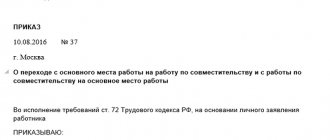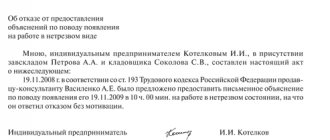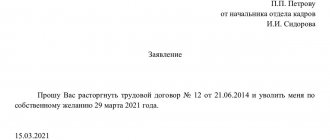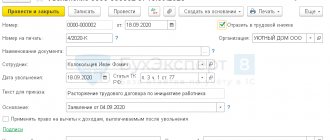In connection with current realities, the topic of violation of employee rights and illegal dismissals is increasingly being taken into account. It is worth first understanding the very concept of illegal dismissal.
Unlawful dismissal of an employee will be the termination of an employment contract by the employer without legal grounds. These types of dismissal include grounds that are not provided for by the Labor Code of the Russian Federation or based on false arguments of the employer, as well as dismissal with non-compliance with the procedure established by law.
You can legally terminate a contract on the following grounds:
- by agreement of the parties;
- upon expiration of the validity period (for concluded contracts for a certain period);
- at the employee’s own request;
- at the initiative of the employer;
- in connection with a transfer to another job;
- due to circumstances that do not depend on the will of the parties to the contract.
But the Labor Code of the Russian Federation does not have the concept of “illegal dismissal” as such, although it may exist if the court found the dismissal to have been committed in violation of legal norms.
What does this mean for the employer?
Termination of labor relations between an employee and an employer is possible at the initiative of the employer, at the initiative of a subordinate, by agreement of the parties, or due to circumstances beyond the control of the parties.
The illegality of dismissal is said to occur when the procedure or procedure for dismissal is violated, or there are no legal grounds for dismissal.
For example, when reducing the number or staff of an enterprise, the employer invites employees to write letters of resignation on their own initiative in order to avoid the need for compensation payments.
An employer who dismisses an employee without legal grounds or in violation of the procedure or procedure for terminating employment relations, if the latter applies to the appropriate authorities, may face:
- administrative;
- criminal;
- civil liability.
conclusions
Most company managers tend to believe that it makes no practical sense to fire an employee on their own initiative. Yes, this solves the problem, and the company stops seeing the boring face in the workplace. But there is also the so-called “own desire”, which, in most cases, is offered to subordinates. Fortunately, if the director proposes to resign, then in the future it will be more correct to make an entry “by agreement of the parties.” It implies certain financial compensation for the subordinate and therefore companies do not favor it. If in this case the employee begins to “download his rights,” then this may anger the director, and he will offer to “quit as expected.” In any case, we recommend standing up for your rights and proceeding from a sense of fairness in making decisions.
Thank you for your attention and see you again!
Consequences of illegal dismissal for the employee and employer
In case of illegal dismissal, you must first draw up a letter of claim and present it to your head of the organization (director). This letter must set out the circumstances indicating the illegal nature of the dismissal. In this case, it is necessary to provide links to the relevant articles of the Labor Code of the Russian Federation. The claim is drawn up in two copies. One of them must be sent to the employer, and the other must be kept for yourself.
If there is no positive response to the letter of claim from the employer, then the employee must go to court.
Before contacting the appropriate authorities after illegal dismissal, the employee must request the following package of documents from the employer:
- employment contract (agreement);
- dismissal order;
- employment history;
- The order of acceptance to work;
- a certificate indicating the position and profession of the dismissed employee;
- certificate of the average salary of the dismissed employee;
- personal description from the place of work;
- any written evidence confirming the fact of violation by the employer of the provisions of the Labor Code of the Russian Federation.
If within three working days after a written request the employer has not provided the requested documentation, then this fact must be indicated in the lawsuit.
The statement of claim must indicate a clause on requesting the necessary documents from the employer.

If no action is taken from the employer, then your written claims should be sent directly to the court. According to Art. 391 of the Labor Code of the Russian Federation, the court directly considers disputes regarding the employee’s demands for reinstatement at work, regardless of the grounds for termination of the employment contract, or for changing the date and wording of the reason for dismissal. In addition to the court, an employee can appeal to the following authorities:
- Trade union. The trade union accepts requests (complaints) from illegally dismissed employees. If there are legal grounds, the trade union sends a written complaint to the state labor inspectorate.
- Labor Dispute Commission. It is created within the organization itself and resolves disputes between the employer and employees. Small firms usually do not have such commissions, nor do they have trade unions.
- State Labor Inspectorate.
After accepting an official complaint, the labor inspector conducts an inspection within 10 days. The inspectorate may impose a fine on the employer and issue an order to eliminate violations. Some inspectorates issue orders to reinstate an employee to his position, but others indicate that this is the prerogative of exclusively the judicial authorities. It is better to clarify in advance, at an appointment with the inspector, what practice has developed in your region. - Prosecutor's office. The prosecutor may demand an unscheduled inspection of the employing organization, or go to court if the citizen cannot do this himself. Prosecutors also participate in cases of reinstatement, monitoring compliance with the law.
- Court. If contacting the labor inspectorate and the prosecutor's office does not lead to the desired result, then you should directly contact the district court. It is important to consider that this must be done within one month from the date of dismissal. Therefore, it is better not to delay the decision to go to court for too long. You can skip all other authorities and immediately write and submit a statement of claim.
If the court makes a decision on this issue in favor of the plaintiff - the dismissed employee, then the execution of the court decision is monitored by FSSP bailiffs.
Bailiffs do not allow an unscrupulous employer to evade the obligation to reinstate and pay the employee due compensation.
Evidence in a case of unjustified dismissal may be as follows (Article 55 of the Code of Civil Procedure of the Russian Federation):
- testimony of the parties and third party witnesses;
- employment agreement (contract);
- orders, instructions of the defendant-employer;
- calculation sheets;
- salary slips;
- report of an industrial accident;
- audio and video recordings;
- expert opinions, etc.
As evidence of the illegality of dismissal, the court can be presented with reports of conclusions from employees of the prosecutor's office and labor inspectorate, if the employee applied there.
Any dismissal, even if it was initiated by the employee, but took place in violation of labor laws, can be considered illegal. In this case, even what many people think are little things matter:
- labor registration deadlines;
- settlement payment day;
- failure to comply with the form and procedure for notification of layoffs;
- ignoring additional reasons for leaving a specialist at his workplace;
- unreasonably strict disciplinary action;
- forcing an employee to resign.
Often the employer uses such a scary, at first glance, word as certification to quickly release the regular salary, threatening to expel the employee due to incompetence. Most of these managers do not even remotely imagine how meticulously such cases are considered in court, and how many decisions are made in favor of employees.
In other words, if the management, out of ignorance or arbitrariness, missed even a small step in the dismissal procedure, then the hired person always has the opportunity to fight not only for reinstatement at work, but also to receive additional money.
If a person’s immediate plans did not include looking for a new job, but he is still given a dismissal order, then he should, first of all, evaluate the legality of management’s actions. In fact, there are quite a few cases of termination of employment relationships for far-fetched reasons or for insufficient reasons. Since the employee is confident in his own rightness, then he needs to start acting immediately. The chances of success in this matter will be higher if:
- the employee himself did not write a letter of resignation or relocation;
- a person generally carefully read everything that was given to him to sign, and ideally, he took copies of documents;
- Less than a month has passed since the specialist’s illegal dismissal from work, Art. 392 Labor Code of the Russian Federation.
There are two ways to appeal management’s actions: administrative complaints and a lawsuit. The first option is, of course, simpler and cheaper, but the result is mostly inexpressive. A wounded employee can only get real help in court.
If the dismissal was actually carried out in disregard of the norms of the Labor Code of the Russian Federation, then it is the employer who should be afraid of the consequences, and not the former employee. But there are a few nuances:
- being late on deadlines deprives you of the opportunity to demand anything, even if the person is completely right;
- reinstatement to the same place is not always the best idea; the court is unlikely to simplify relations with superiors, and will also help with career advancement;
- the law allows you not to demand reinstatement at work, but to limit yourself only to a request for compensation; after reinstatement, you will have to quit under Art. 80 of the Labor Code of the Russian Federation, possibly with working out.
We invite you to read: A police officer has the right to deliver citizens who are
Most likely, even a simple appeal to the labor inspectorate will sober up the management, and the person will be accepted back and paid all the due amounts.

But even if a positive court decision is received, there are situations when the employee still ends up losing. Most often this happens to women who are on maternity leave or about to leave it. During parental leave, the company may be liquidated or cease operations.
The main guarantee in a positive consideration of a case of illegal dismissal is the opportunity for the employee to return to his previous place on the day the decision is made. If the employer still does not allow the employee to perform his duties, then this will be considered a repeated violation of labor legislation, which means that new proceedings, inspections and a new administrative fine are just around the corner, only with more severe consequences, Art. 396 Labor Code of the Russian Federation.
Whether an employee should return to such an employer is up to him to decide, but there are several situations when reinstatement is impossible for objective reasons, Art. 394 Labor Code of the Russian Federation:
- if the employee does not ask for reinstatement, but only wants to change the wording in the order and work book;
- if during the course of the dispute the term of the employment contract has expired;
- if during this time the person has already started working at another enterprise (the date of dismissal should then be indicated the day before the new employment).
A creative approach to dismissing one of the team members may result in fines, costs and administrative measures against the employer. Unfortunately, not many of those who have experienced unfair treatment from their superiors decide to fight for their rights, because the courts in such situations often take the side of the hired persons, and not their employers.
Zinovieva Natalya Igorevna
Lawyer at the Legal Defense Board. Specializes in handling cases related to labor disputes. Defense in court, preparation of claims and other regulatory documents to regulatory authorities.
Still have questions on the topic Ask a lawyer
Features of the recovery procedure
If an employee is signed under a fixed-term employment contract and is dismissed before the end of the term , the court will recognize the illegality of the dismissal if the term of the contract has not expired. As the Plenum of the Supreme Court of the Russian Federation of March 17, 2004 decided in paragraph 60, otherwise the wording is changed to the option “dismissal upon expiration of the contract.”
From the date of reinstatement of a dismissed specialist, the continuity of his work experience is restored , including the time of unforeseen absenteeism.
This length of service is also taken into account when applying for regular leave (Article 121 of the Labor Code of the Russian Federation).
After restoration, you can count on disability benefits , even if in fact the employee has not yet begun to perform his work duties.
Complete evidence of the existence of obstacles to entering a promising job in the event of a legally illiterate dismissal is a court decision and information about the former employee’s lack of other paid work during this period (according to entries in the work book).
If the employee was employed at another enterprise after such a dismissal , payment for forced absence is replaced by compensation for the difference between the salary at the new place and the previous one (if the salary at the new job is lower). The wording of dismissal, recognized as illegal, is considered an obstacle to obtaining a job with a decent salary.
The order to terminate the contract is given to the employee against signature . At the request of the dismissed employee, he is given a copy of the order certified by the employer. If the employee refuses to sign or it is impossible to notify him, a corresponding note is made on the document.
The date of termination of the contract is considered the day of the employee’s last working day , except for the case when he did not work while retaining his place and position. On the day of termination of the employment relationship, the employee is given a labor certificate and salary (Article 140 of the Labor Code of the Russian Federation). If an employee asks for other copies of documents related to his work activities, the manager is obliged to give them to him.
The basis for termination of the employment agreement is recorded exactly in accordance with the Labor Code of the Russian Federation or other Federal Law, indicating the relevant links to their articles. If it is impossible to issue a work book to a dismissed employee , he is notified in writing to obtain consent to send the work book by mail.
After this procedure, the manager is relieved of responsibility for the timely issuance of the work book. If an employee applies in writing regarding the issue of a book, the employer is obliged to satisfy the request no later than 3 days after receiving the application.
Consequences of illegal dismissal for the employee and employer
If a dismissed employee believes that his labor rights have been violated, he must follow the following procedure:
- Submit a written complaint to your employer.
- If there is no positive result, contact the labor inspectorate (Rostrud) and the prosecutor's office.
- If there is no expected result from the actions of Rostrud employees and the prosecutor's office, you should go to court. Within one month from the date of dismissal, the dismissed employee must draw up and file a claim in the district court.
If the court makes a judicial decision declaring the dismissal of an employee illegal, then the employer must not only reinstate the employee in his previous position, but also pay him compensation established by Art. 234 and 394 of the Labor Code of the Russian Federation.
The success of a legal procedure to protect labor rights largely depends on how quickly the dismissed employee began to act. That is why he needs to immediately submit a written complaint to the relevant authorities listed above immediately after dismissal.
The employer's liability will vary depending on the authority to which the illegally dismissed subordinate applied and his request.
Administrative
A person who considers his dismissal to be illegal has the right to appeal to the State Labor Inspectorate of his region.
You can file a complaint with the Labor Inspectorate:
- in person, by coming to the Labor Inspectorate;
- sent by post;
- via the Internet on the Inspectorate website.
A state labor inspector who has received an appeal from an illegally dismissed person is obliged to review it within 30 days and conduct an inspection based on the facts stated in it. If the arguments specified in the complaint are confirmed, the labor inspector:
- draws up a protocol and issues a resolution on bringing to administrative liability under Article 5.27 of the Code of Administrative Offenses of the Russian Federation;
- holds the guilty person accountable if the arguments of the appeal are confirmed during the inspection;
- issues an order to eliminate violations identified during the inspection.
The sanction of Article 5.27 of the Code of Administrative Offenses of the Russian Federation provides for administrative punishment for improper dismissal of an employee in the form of a warning or a fine.
- from 1 to 5 thousand rubles – for an official;
- from 1 to 5 thousand rubles – for an individual entrepreneur;
- from 30 to 50 thousand rubles – for a legal entity.
Criminal
An employer may not be held criminally liable in every case of termination of employment relations with an employee, but only upon dismissal:
- a person who has reached pre-retirement age (Article 144.1);
- a woman in a situation or raising a child under three years of age (Article 145).
Criminal Code of the Russian Federation Article 145. Unreasonable refusal to hire or unjustified dismissal of a pregnant woman or a woman with children under three years of age
Unreasonable refusal to hire or unjustified dismissal of a woman on the grounds of her pregnancy, as well as unjustified refusal to hire or unjustified dismissal from work of a woman who has children under three years of age, for these reasons - is punishable by a fine of up to two hundred thousand rubles. or in the amount of wages or other income of the convicted person for a period of up to eighteen months, or by compulsory work for a period of up to three hundred and sixty hours.
To bring to criminal liability, the investigative body must prove that the reason for dismissal is precisely the employee’s pre-retirement age, the employee’s pregnancy, or the presence of a young child.
Investigators of the Investigative Committee of the Russian Federation are involved in the investigation of criminal cases of this category.

The head of an organization or an individual entrepreneur may be held liable. The sanction of these articles provides for punishment in the form of:
- a fine of no more than 200 thousand rubles;
- salary or other income of the guilty person for a period of no more than one and a half years;
- compulsory work for a period of no more than 360 hours.
If an employee believes that violations were committed during his dismissal, he has the right to go to court. It should be borne in mind that a claim for reinstatement at work can be filed with a judicial authority:
- at the location of the enterprise;
- at the place of residence of the plaintiff;
- at the place of execution of the contract, if such a place is specified in the contract and differs from the location of the organization and the plaintiff.
What an employee should do if a labor dispute arises during dismissal and what the statute of limitations is is described here.
If the plaintiff's demands for reinstatement are satisfied, the court obliges the defendant to pay the illegally dismissed employee wages for the period of forced absence, calculated from the date of illegal dismissal until the date of reinstatement.
We invite you to read: Advance agreement when purchasing an apartment
If, by the time the labor dispute is considered, the employee does not intend to be reinstated in the position previously held by the employer, but violations were committed during his dismissal, the court may change the wording of the dismissal to dismissal at his own request, while simultaneously collecting wages for the period of forced absence.
Also, Article 394 of the Labor Code of the Russian Federation provides for the right of the court, on the basis of the plaintiff’s application, to limit itself to collecting the above monetary compensation from the employer.
Article 394 of the Labor Code of the Russian Federation provides for the right of an employee to recover compensation for moral damage caused to him by illegal dismissal.
In accordance with Article 237 of the Labor Code of the Russian Federation, moral damage in disputed legal relations is subject to compensation regardless of compensation for material damage.
Labor Code of the Russian Federation Article 237. Compensation for moral damage caused to an employee
Moral damage caused to an employee by unlawful actions or inaction of the employer is compensated to the employee in cash in amounts determined by agreement of the parties to the employment contract. In the event of a dispute, the fact of causing moral damage to the employee and the amount of compensation for it are determined by the court, regardless of the property damage subject to compensation.
It should be borne in mind that the very fact of termination of employment relations with an employee without legal grounds or with violations is a reason for collecting compensation for moral damage from the employer, but its amount will be determined by the court in each specific case individually.
Reverse foreclosure process
The reverse process of collecting from the plaintiff the amounts that were paid to him by a court decision when the decision is canceled is allowed in the case where the cancellation of the decision was based on false data or fictitious documents (Article 397 of the Labor Code of the Russian Federation).
A reversal of the implementation of court decisions is allowed in relation to financial issues (payments for absenteeism) in some cases:
- cancellation of the decision by way of supervision;
- cancellation based on false information and forged documents provided by the plaintiff.
These restrictions refer to some guarantees for employees, but this is only subject to a change in the execution of the decision. As a matter of supervision, other cases for the recovery of monetary compensation are not considered .
In accordance with Art. 443 of the Code of Civil Procedure of the Russian Federation, a change in the execution of a court decision should mean the return to the defendant of everything that was collected according to the decision that was canceled.
Such an outcome of events is possible both by decision of the court of first instance and by the appellate or cassation bodies. Issues of reverse recovery are also regulated by Art. 444-445 Code of Civil Procedure of the Russian Federation.
How to write a complaint to Rostrud and the prosecutor's office?
In case of unjustified dismissal, you can write an application (complaint) to the labor inspectorate (Rostrud) or to the prosecutor's office. The written application to Rostrud must indicate such information as is consistent with the provisions of paragraph 1 of Art. 11 Federal Law No. 59 of May 2, 2006:
- position and full name of the head of the state organization in the dative case (“Head of the state labor inspection for (name of locality)”);
- Full name of the applicant in the genitive case;
- the word "Complaint";
- Full name of the applicant;
- full name of the employing organization;
- TIN, OGRN of the enterprise;
- address of the employing organization;
- date of dismissal;
- the article under which the employee was dismissed;
- the reason for the appeal (“illegal dismissal”), the norms and articles of the Labor Code of the Russian Federation that were violated;
- evidence of illegality of dismissal (for example, photocopies of employment documents);
- applicant's contacts;
- the address where inspectors will send a response to the complaint;
- date of filing the complaint;
- personal signature of the applicant.
If you contact the prosecutor's office, you must indicate the following details in your complaint:
- Full name of the prosecutor;
- name of the prosecutor's office;
- address, telephone and email address of the applicant;
- address, telephone and email address of the employer;
- title of the document (“STATEMENT on taking action against an employer who has committed violations of labor laws in the form of illegal dismissal”);
- term of the employment contract;
- the applicant's position;
- number and date of conclusion of the employment contract (agreement);
- number and date of the employment order;
- article of the Labor Code of the Russian Federation, according to which the employee was dismissed from work;
- dismissal order;
- the essence of the circumstances as a result of which certain labor rights of the employee were violated;
- a request for the elimination of violations or for the employer to take other appropriate measures (for example, reinstatement to the previous position);
- date of filing the complaint;
- personal signature of the applicant.
On the websites of government agencies, complaints can be submitted electronically.
Consequences of illegal dismissal for the employee and employer
If the court, having considered the case based on the claim of a former employee, comes to the conclusion that his dismissal was illegal, it makes a decision according to which the employee is subject to reinstatement.
The decision to reinstate him at work is subject to immediate execution, that is, immediately after the court makes the operative part of the decision, the plaintiff is issued a writ of execution, on the basis of which he must be immediately allowed to work.
Immediate execution of the decision to reinstate a former employee at work does not deprive the employer of the right to appeal the decision if he does not agree with it.
Clause 2 of part 1 of Article 83 of the Labor Code of the Russian Federation, as one of the grounds for dismissal, independent of the will of the parties, provides for the dismissal of an employee in connection with the reinstatement of a person who was previously illegally dismissed.
Thus, if at the time the court makes a decision on the illegality of termination of labor relations, a new employee is hired to replace the dismissed person, the latter is subject to dismissal in accordance with paragraph 2 of part 1 of Article 83 of the Labor Code of the Russian Federation.
However, the legality of the employer’s actions when terminating the employment relationship with a subordinate can be verified not only by the court, but also by the State Labor Inspectorate.
If, during an inspection at the request of an illegally dismissed person, the labor inspector comes to the conclusion that the employer committed violations that entail the reinstatement of the employee to his previously held position, he will issue an appropriate order to eliminate the violations.
For failure to comply with an order issued by the State Labor Inspectorate, administrative liability is provided under Article 19.5 of the Code of Administrative Offenses of the Russian Federation.
Very tough initiative
For your information, it is worth mentioning when an employer not only has the right, but must take measures to “get rid of” an employee if:
- There was absenteeism or absence from work without a valid reason;
- The subordinate has repeatedly refused or evaded the performance of official duties;
- Accordingly, he constantly violates the requirements of the internal regulations;
- He came to work drunk or under the influence of drugs;
- They divulged state and commercial secrets;
- He stole property entrusted to him;
- He committed a number of immoral acts (mainly concerning educators and teachers).
This list can be continued with several more points, but their meaning is similar to those indicated. In principle, each of them seems logical enough to punish a colleague to the fullest extent of corporate law.
Punishment for unlawful dismissal of an employee from office
Criminal
According to Art. 24 of the Code of Civil Procedure of the Russian Federation in all cases within the jurisdiction of courts of general jurisdiction, you must apply to the district court. A claim for illegal dismissal is filed in court both at the legal address of the employing organization and at the place of residence of the dismissed defendant employee (clause 6.3 of Article 29 of the Code of Civil Procedure of the Russian Federation). The statement of claim to the court shall contain the following information:
- full name of the court;
- Full name and residence address of the plaintiff;
- full name and address of the defendant-employer;
- information about labor relations (when the plaintiff was hired and fired, under what article and order);
- the circumstances and reasons why the plaintiff was illegally fired from work;
- a requirement for reinstatement at work, if the employee is interested in this, payment of compensation in the amount of average earnings for each day of absenteeism and compensation for moral damage;
In case of going to court in a case of illegal dismissal, the employee is exempt from paying state duty (Article 333.36 of the Tax Code of the Russian Federation, Article 393 of the Labor Code of the Russian Federation).
According to Art. 392 of the Labor Code of the Russian Federation, a claim for illegal dismissal is filed in court within one month from the date of dismissal. This is considered the day a photocopy of the dismissal order or work record book is issued to the dismissed employee.
If the applicant applied to the court later than the deadline established by law, then in the claim he must indicate valid reasons for such absence. These, for example, are the illness of the plaintiff, a business trip, the need to provide constant care for a seriously ill close relative, etc.
The deadlines for filing a claim in court and the consequences of missing this time are described here.
If the court satisfies the plaintiff's claims, the defendant employer is obliged to reinstate the dismissed employee at his previous place of work. If this is not possible due to the liquidation of the organization (company), then the employer can change the wording of the grounds in the order to dismiss the employee to redundancy or agreement of the parties.
The employee's reinstatement to his previous job is carried out on the day the court decision is made. Bailiffs monitor the employer's compliance with such a court decision.
Arbitrage practice
- Example 1. F. filed a lawsuit against the State Public Institution SO "Arena" for reinstatement, indicating that he worked in the institution in the building maintenance department as a refrigeration engineer from 06/19/2016, and from 03/13/2018 - in the position engineer of the department for the operation of the building and equipment of the Trud sports complex. On May 31, 2018, he was dismissed from his position under clause 13 of part 1 of Article 83 of the Labor Code of the Russian Federation, due to restrictions on his employment in the field of sports with the participation of minors, established by the fact of criminal prosecution by the Central District Department of Internal Affairs of Togliatti in 1996.
When considering the case, the court found that the criminal prosecution against the plaintiff was terminated due to the entry into force of the new Criminal Code of the Russian Federation and the decriminalization of the act charged to him.At the same time, the defendant did not provide evidence that the criminal prosecution against the plaintiff was terminated on non-rehabilitative grounds. In addition, the plaintiff’s work function was not related to the field of children’s and youth sports. In connection with the above, the court came to the conclusion that there were no legal grounds for the plaintiff’s dismissal.
The legality of the decision was verified by the Samara Regional Court, which also indicated that in the absence of restrictions on work activities in the field of education, upbringing, development of minors, organization of their recreation and health, in the field of children's and youth sports, the employment contract concluded with F. was illegally terminated on the basis of clause 13, part 1, art. 83 Labor Code of the Russian Federation.
F. was reinstated in his position, wages were recovered in his favor for the period of forced absence, as well as compensation for moral damage (Appeal ruling of the Samara Regional Court dated November 6, 2018 in case No. 33–13320/2018).
- Example 2. By Resolution of the State Labor Inspectorate in the Rostov Region No. 3.1.5/32/5 dated April 12, 2017, Tutsi Kuban LLC was found guilty of committing an administrative offense under Part 1 of Art. 5.27 of the Code of the Russian Federation on Administrative Offenses, and was punished with an administrative fine in the amount of 40,000 rubles. The basis for bringing a legal entity to administrative liability were violations committed during the dismissal of M. N. G.
During the inspection, it was found that M. N. G. was dismissed from Tutsi Kuban LLC in violation of the requirements established by paragraph 3 of part 1 of Article 77, Articles 80, 84.1 of the Labor Code of the Russian Federation in the absence of a written statement from the employee to terminate the employment contract at his own request , on the basis of an order that does not contain information about the reason for dismissal.The labor inspector qualified the actions of Tutsi Kuban LLC under Part 1 of Article 5.27 of the Code of Administrative Offenses of the Russian Federation.
The legality of the decision of the State Labor Inspectorate was verified by the judicial authorities; no grounds for its cancellation were established (Resolution of the Rostov Regional Court dated December 14, 2017 No. 4a-1296/2017).
If the employer decides to dismiss an employee from his position without sufficient grounds or in violation of the dismissal procedure or procedure, he should be prepared for certain consequences, such as administrative or criminal liability, reinstatement of the illegally dismissed person at work with payment of wages for the period of forced absenteeism and compensation for moral damage.
Most common violations
- Failure to comply with the dismissal procedure when an employee commits a disciplinary offense (Articles 192 and 193 of the Labor Code of the Russian Federation). The most common employer mistakes:
- lack of a written explanation from the offending employee;
- the violation of labor discipline was not gross (their types are listed in Article 81 of the Labor Code of the Russian Federation), and the employee had not previously received disciplinary sanctions;
- dismissal for misconduct for which a disciplinary sanction has already been imposed;
- the deadline for bringing to justice has been violated. According to Art. 193 of the Labor Code of the Russian Federation, disciplinary action must be applied no later than a month from the date of discovery of the misconduct, minus the time of illness, vacation and the time necessary to obtain the opinion of the trade union;
- the reason for the offense was not taken into account (maybe it was a forced measure), the degree of guilt and the severity of the act committed.
- Failure to comply with the reduction procedure prescribed in Article 180 of the Labor Code of the Russian Federation. Thus, an employee will be reinstated if:
- he was not notified of the reduction two months before the start of the activities;
- he had the right of priority to remain at work. Article 179 of the Labor Code of the Russian Federation establishes that such employees include those who, in comparison with others. has high qualifications and labor productivity, who is the sole breadwinner, has two or more children, who was injured at work, etc.;
- he was not offered another position, although there was one in the company.
- Unjustified use of the wording “inconsistency with the position held” (clause 3 of Article 81 of the Labor Code of the Russian Federation) or for medical reasons. Termination of a contract can be challenged in court if:
- the employee was not certified to confirm that he lacked the necessary knowledge and qualifications, or the certification procedure was violated (clause 3, part 1, article 81 of the Labor Code of the Russian Federation);
- there is no medical report that would confirm the presence of health problems that interfere with the performance of work (Clause 8 of Article 77 of the Russian Federation).
- Unlawful dismissal during probationary period. An employee will be allowed to work again by court decision if, 3 days before dismissal, he was not provided with a reasoned notice that he cannot cope with his job duties (Part 3 of Article 71 of the Labor Code of the Russian Federation), and there is no written confirmation that the employee failed the test.
- The employment contract was terminated while the employee was on sick leave or on vacation, except in cases where the enterprise is liquidated or the individual entrepreneur ceases its activities.
- Failure to pay wages for days worked, compensation for unused vacation, or severance pay in case of layoff. We remind you that in case of layoff, the dismissed person retains his salary for the period of employment up to three months after the layoff (Article 178 of the Labor Code of the Russian Federation). He is also entitled to severance pay, the amount of which, as a general rule, is the average monthly salary (Part 4 of Article 178 of the Labor Code of the Russian Federation).
Grounds for dismissal
| Grounds for dismissal | The essence of the violation | Violated Labor Code norms |
| Reduction | Failure to comply with warning deadlines. | Warning period – at least 2 months, Art. 180 Labor Code of the Russian Federation. |
| Reluctance to transfer a person to other positions within the company. | If the enterprise has vacancies that are suitable for education and health, then they must be offered to those who are being laid off, Art. 180 Labor Code of the Russian Federation. | |
| Fictitious reduction. | The dismissal of some and the simultaneous hiring of new workers gives grounds to question the legality of the reduction itself, and is easily challenged in court. | |
| Dismissal of a pregnant woman | For truancy, for theft, for insubordination and the like. This also includes refusal to hire due to pregnancy. | It is impossible to fire an expectant mother (except in cases of complete liquidation of the enterprise). If the woman did not write the application in her own hand, then such actions will be qualified as illegal dismissal of the employee, Art. 261 Labor Code of the Russian Federation. |
| Calculation of a minor | For any reason other than Art. 80 Labor Code of the Russian Federation. | Even if there is evidence of the need for such dismissal, you need to ask the opinion of the state labor inspector and the commission for minors. |
| Dismissal as a type of penalty | The reasons and degree of guilt, according to the employee, are insignificant. | Article 192 of the Labor Code offers three types of punishment at the choice of the employer, but at the same time imposes on him the obligation to commensurate their severity with the severity of the consequences of the offense. |
| Dismissal for failure to fulfill job duties | Payment for the first violation or for minor offenses. Assigning additional functions to an employee without his consent. | Article 60 of the Labor Code of the Russian Federation prohibits requiring an employee to perform those duties that are not specified in one of the documents: a job description, an employment contract or a separate order with which the employee agreed. Dismissal on these grounds will most likely be considered illegal. |
| Dismissal for a reason that is not included in the Labor Code of the Russian Federation | Inconsistency between the reasons for termination of the contract and labor legislation. | If an employee is fired for inappropriate hair color or passion for chess, then the employer is unlikely to be able to find a suitable clause in the code. This means that there is an illegal dismissal. |
We invite you to read: Death of an employee, basic rules for dismissal
Every employee whose boss threatens him with dismissal, but at the same time requires him to write a statement of his own free will or sign an agreement between the parties, has reason to think about it.
Employer's liability
According to Art. 5.27 of the Code of Administrative Offenses of the Russian Federation, in case of illegal dismissal of an employee, the following fines are imposed on the employer:
- 1,000–5,000 rub. - for an employer - an official;
- 1,000–5,000 rub. — for individual entrepreneurs without forming a legal entity;
- 30,000–50,000 rub. - to a legal entity.
The imposition of fines is an administrative liability; it occurs regardless of what the court decides on the reinstatement of the employee. To hold the employer accountable, you need to contact Rostrud or the prosecutor's office.
Is compensation due? How many? And when can I get it?
The main argument when appealing to government supervisory authorities in the field of labor relations or to the court is by no means an attempt to restore the truth. Of course, if we are not talking about changing the wording in the dismissal order to a more acceptable one or damaging professional reputation. In other cases, the former employee is driven by the intention of receiving compensation for illegal dismissal.
When there is no doubt about the illegality of termination of the employment contract, the employee can count on:
- compensation for forced absenteeism, average earnings, is calculated according to Art. 139 of the Labor Code of the Russian Federation (although the court must consider such a case before the expiration of a month, in reality it “accumulates” about 60 days of absenteeism);
- arrears of wages, if any, and their indexation;
- compensation for moral suffering (there are examples when plaintiffs claim almost a million rubles in compensation, but most judges agree to an amount of up to 5 thousand);
- expenses for legal support (here the court can also cut them if they seem excessive to it).








